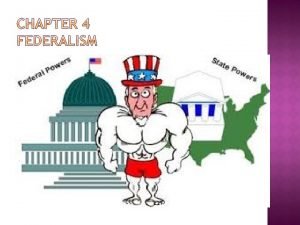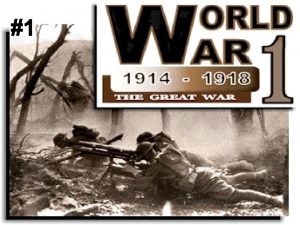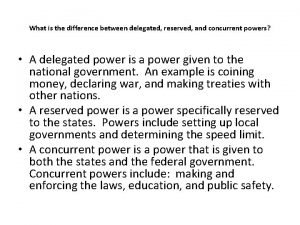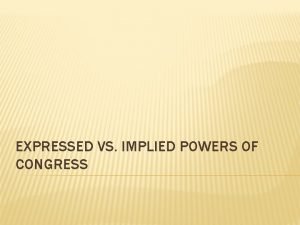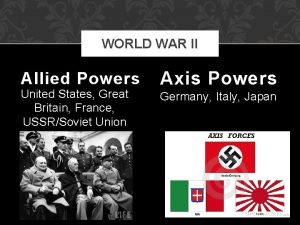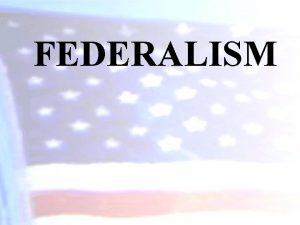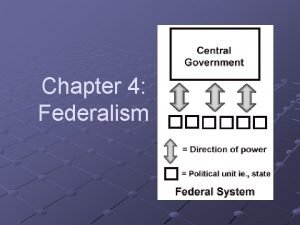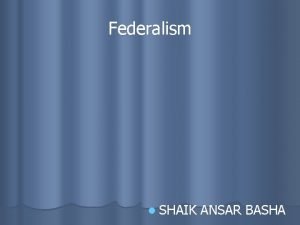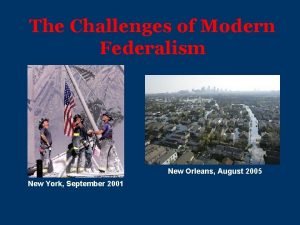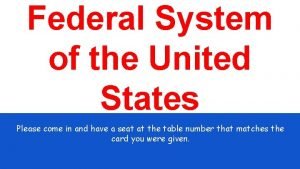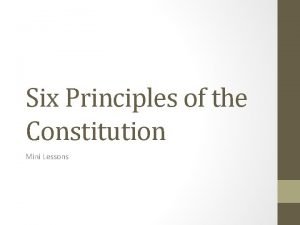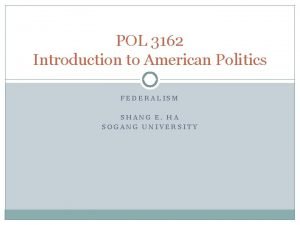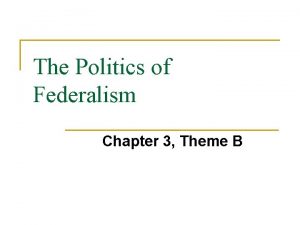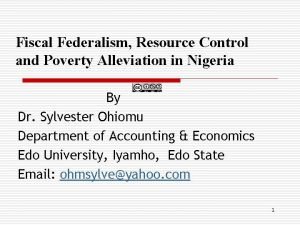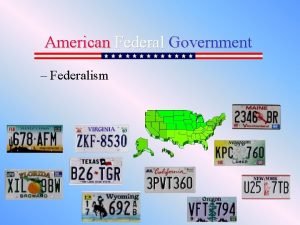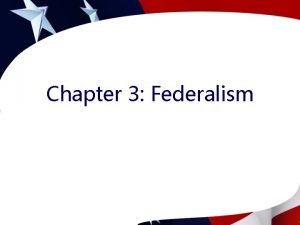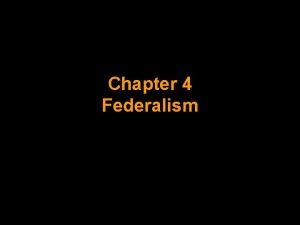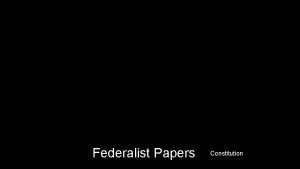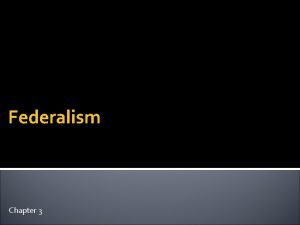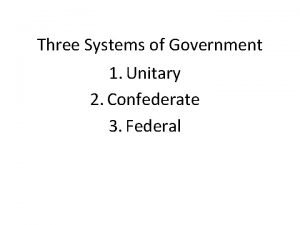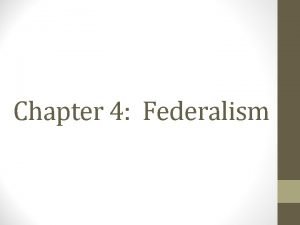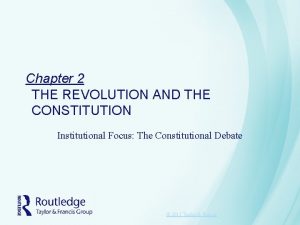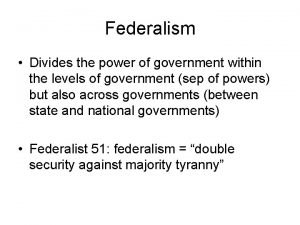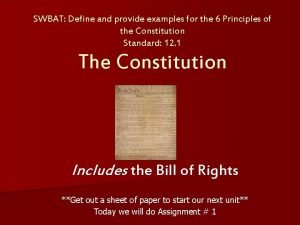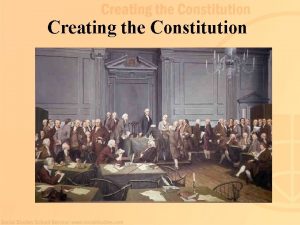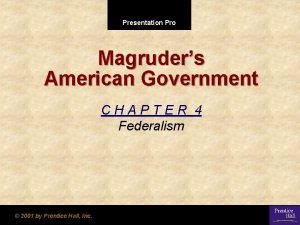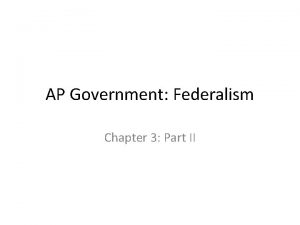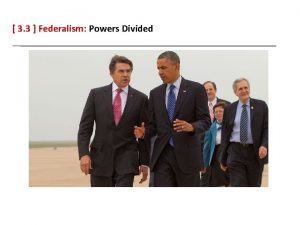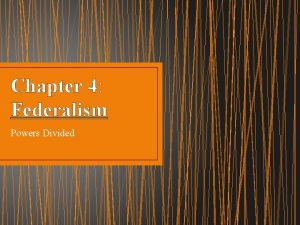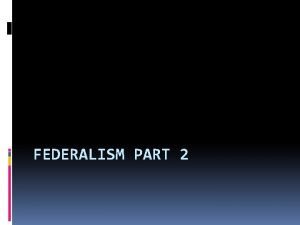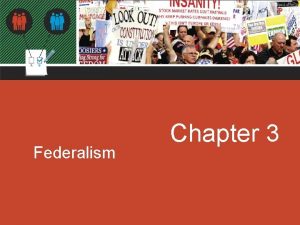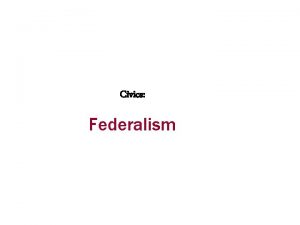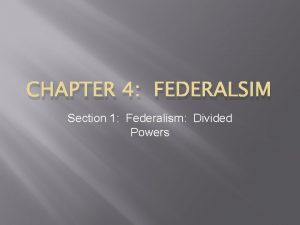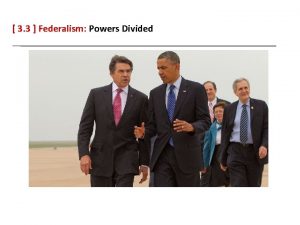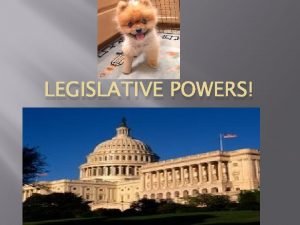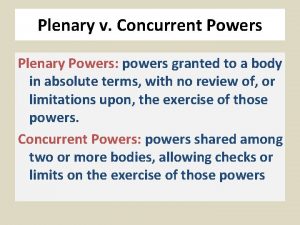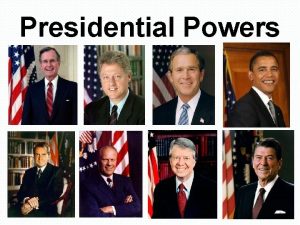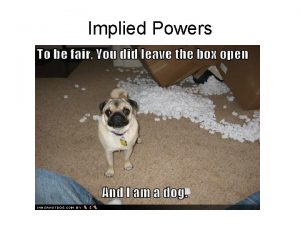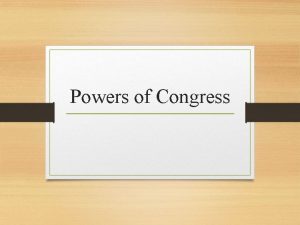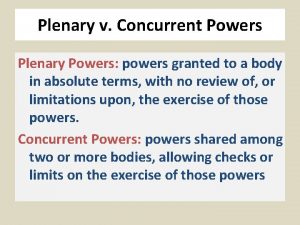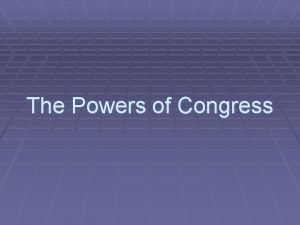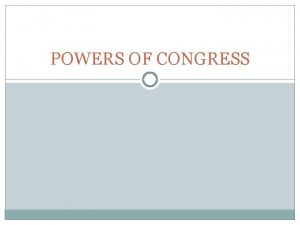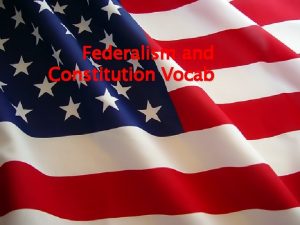3 3 Federalism Powers Divided 3 3 Federalism
![[ 3. 3 ] Federalism: Powers Divided [ 3. 3 ] Federalism: Powers Divided](https://slidetodoc.com/presentation_image_h/30c3e2b86fce3a15381fcd690c0dc27c/image-1.jpg)
![[ 3. 3 ] Federalism: Powers Divided Learning Objectives • • • Define federalism [ 3. 3 ] Federalism: Powers Divided Learning Objectives • • • Define federalism](https://slidetodoc.com/presentation_image_h/30c3e2b86fce3a15381fcd690c0dc27c/image-2.jpg)
![[ 3. 3 ] Federalism: Powers Divided Key Terms • • • Federalism division [ 3. 3 ] Federalism: Powers Divided Key Terms • • • Federalism division](https://slidetodoc.com/presentation_image_h/30c3e2b86fce3a15381fcd690c0dc27c/image-3.jpg)






























- Slides: 33
![3 3 Federalism Powers Divided [ 3. 3 ] Federalism: Powers Divided](https://slidetodoc.com/presentation_image_h/30c3e2b86fce3a15381fcd690c0dc27c/image-1.jpg)
[ 3. 3 ] Federalism: Powers Divided
![3 3 Federalism Powers Divided Learning Objectives Define federalism [ 3. 3 ] Federalism: Powers Divided Learning Objectives • • • Define federalism](https://slidetodoc.com/presentation_image_h/30c3e2b86fce3a15381fcd690c0dc27c/image-2.jpg)
[ 3. 3 ] Federalism: Powers Divided Learning Objectives • • • Define federalism and explain why the Framers adopted a federal system instead of a unitary system. Categorize powers delegated to and denied to the National Government, and powers reserved for and denied to the States, and the difference between exclusive and concurrent powers. Summarize the obligations that the Constitution, as the 'the supreme Law of the Land, ' places on the National Government with regard to the States.
![3 3 Federalism Powers Divided Key Terms Federalism division [ 3. 3 ] Federalism: Powers Divided Key Terms • • • Federalism division](https://slidetodoc.com/presentation_image_h/30c3e2b86fce3a15381fcd690c0dc27c/image-3.jpg)
[ 3. 3 ] Federalism: Powers Divided Key Terms • • • Federalism division of powers delegated powers expressed powers implied powers inherent powers reserved powers exclusive powers concurrent powers Supremacy Clause John Marshall

The Founders Choose Federalism You know that federal law requires young men to register for military service at age 18, that most employers must pay their workers at the least a minimum wage set by act of Congress, and that no person can be denied a job on the basis of his or her race or ethnicity.

The Founders Choose Federalism • Balancing National and State Powers

The Founders Choose Federalism Federal law requires men to register for the draft at age 18. Federal law also sets a minimum wage, but States can as well. Many laws reflect this federal and State division of power.

What Is Federalism? Federalism Defined Federalism is a system of government in which a written constitution divides the powers of government on a territorial basis, between a central government and several regional governments, usually called states or provinces. Each of those basic levels of government has its own substantial set of powers. Neither level, acting alone, can change the basic division of powers the Constitution has created. Additionally, each level of government operates through its own agencies and acts directly through its own officials and laws.

What Is Federalism? • • Federalism Defined Strengths of Federalism

What Is Federalism? The division of power between federal and State governments often requires national and local leaders, like President Obama and Texas Governor Rick Perry, to work together.

What Is Federalism? Welfare reform has alternated between State and National governments for many years. Analyze Charts How are welfare programs now managed at both levels of government?

Three Types of Federal Powers The National Government is a government of delegated powers. That is, that government has only those powers delegated (granted) to it in the Constitution. There are three distinct types of delegated powers: expressed, implied, and inherent.

Three Types of Federal Powers • • • The Expressed Powers The Implied Powers The Inherent Powers

Three Types of Federal Powers Much of the media these teens access is regulated by the Copyright Law of the United States. The right to create that law was granted to the Federal Government by the Constitution.

Three Types of Federal Powers The 2001 attacks on the U. S. led to the formation of the Department of Homeland Security. Analyze Charts What are the advantages of having a single agency responsible for national security?

Powers Denied to the Federal Government Although the Constitution delegates certain powers to the National Government, it also denies certain powers to that level of government in order to keep federalism intact. It does so in three distinct ways.

Powers Denied to the Federal Government Visitors view the Bill of Rights at the National Archives Building. These first 10 amendments to the Constitution limit federal power in some areas and guarantee some personal freedoms.

Powers Denied to the Federal Government The powers denied to the National Government are varied and extensive. Analyze Charts How is federalism preserved by the denial of these powers?

Powers of the Fifty States The 50 States are the other half of the very complicated equation we call federalism. Their many-sided role in the American federal system is no less important than that of the National Government.

Powers of the Fifty States • • Powers Reserved to the States Powers Denied to the States

Powers of the Fifty States One reserved State power is the right to issue licenses to various professionals, such as nurses and physicians. Such a license is required to practice in that particular State.

The Exclusive and the Concurrent Powers Exclusive Powers Most of the powers that the Constitution delegates to the National Government are exclusive powers. That is, they can be exercised only by the National Government; they cannot be exercised by the States under any circumstances.

The Exclusive and the Concurrent Powers • • Exclusive Powers Concurrent Powers

The Exclusive and the Concurrent Powers The 1897 Dingly Tariff Act is an example of the exclusive power to lay duties on imports. Analyze Political Cartoons What was the impact of this act according to this cartoon?

The Constitution Reigns Supreme As you have just seen, the division of powers in the American federal system produces a dual system of government, one in which two basic levels of government operate over the same territory and the same people at the same time. Such an arrangement is bound to result in conflicts between national and State law.

The Constitution Reigns Supreme • • The Supremacy Clause The Supreme Court and Federalism

The Constitution Reigns Supreme This cartoon ran in Harper's Weekly when Congress attempted to remove President Andrew Johnson. Analyze Political Cartoons How did the “disastrous result” illustrate the Supremacy Clause?

Quiz: The Founders Choose Federalism Why did few of the Framers of the American Constitution favor a British-style parliamentary government? A. It was a weak form of government that was unlikely to remain stable. B. It gave too much power to the central government and not enough to local government. C. The American people were unwilling to accept any ideas that came from Britain. D. Few Americans fully understood the complexities of the British parliamentary system.

Quiz: What Is Federalism? Which of the following best describes American federalism? A. B. C. D. a dual form of government multiple independent governments cooperative governments an alliance of governments

Quiz: Three Types of Federal Powers Which of the following is an example of expressed power used by the Federal Government? A. The National Government grants diplomatic recognition to a newly formed state in Africa. B. The National Government decides to mint a $1 coin featuring the face of Martin Luther King, Jr. C. The National Government prohibits racial discrimination in public places. D. The National Government funds and builds a transcontinental high-speed railway.

Quiz: Powers Denied to the Federal Government Which of the following best summarizes all of the powers denied to the National Government? A. Those powers which are held by the States are denied to the National Government. B. Those powers which are held by the people are denied to the National Government. C. Those powers which are not expressly granted in the Constitution are denied to the National Government. D. Those powers which involve individual rights are denied to the National Government.

Quiz: Powers of the Fifty States Which of the following is an example of a power inherently denied to the States? A. B. C. D. A State imposes a ban on Sunday sales of alcohol. A State coins its own form of currency. Several States join together to secede from the United States. A State imposes a tax on Social Security benefits.

Quiz: The Exclusive and the Concurrent Powers If the National Government can make legal decisions for the entire country, why might the same crime be punishable in different ways in different States? A. B. C. D. The right to determine punishments is denied to the National Government. Every State has a unitary form of government. The power to define and punish crimes is concurrent. State governments hold the same powers as National Government.

Quiz: The Constitution Reigns Supreme Which of the following metaphors best describes the role of the Supreme Court relative to the Constitution? A. B. C. D. teacher in a classroom umpire at a baseball game parent in the home policeman at the scene of a crime
 Federalism
Federalism Federalism powers divided
Federalism powers divided Powers of congress
Powers of congress Central powers wwi
Central powers wwi Concurrent reserved and delegated powers
Concurrent reserved and delegated powers Expressed powers and implied powers
Expressed powers and implied powers Informal checks on the president
Informal checks on the president Enumerated powers vs expressed powers
Enumerated powers vs expressed powers Was the united states on the axis powers or allied powers?
Was the united states on the axis powers or allied powers? Federalism
Federalism Chapter 4 federalism
Chapter 4 federalism How is federalism practised
How is federalism practised Dual federalism political cartoon
Dual federalism political cartoon Federalism cartoon explanation
Federalism cartoon explanation Federalism cartoon explanation
Federalism cartoon explanation Federalism
Federalism Picket fence federalism definition
Picket fence federalism definition Whats fiscal federalism
Whats fiscal federalism Federalism
Federalism Federalism: definition
Federalism: definition Picket fence federalism definition
Picket fence federalism definition Chapter 4 section 1 federalism the division of power
Chapter 4 section 1 federalism the division of power Section quiz 4-3 developing federalism
Section quiz 4-3 developing federalism Federalism
Federalism Pubilus
Pubilus Cooperative federalism
Cooperative federalism Government
Government Federalism
Federalism Federalism beliefs
Federalism beliefs Federalists definition
Federalists definition Swbat examples
Swbat examples Problems with the articles of confederation
Problems with the articles of confederation Chapter 4 federalism
Chapter 4 federalism Fiscal federalism definition ap gov
Fiscal federalism definition ap gov

